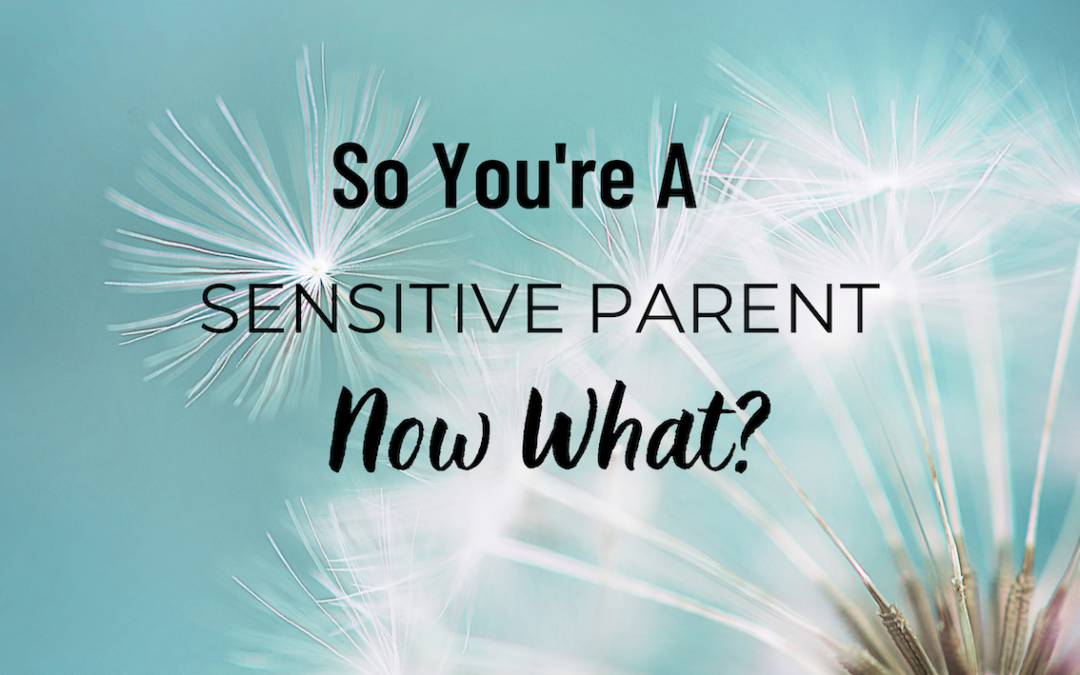If you polled my family members and asked them to pick one word to describe me, I’m guessing the most popular answer would be “sensitive.” As a little girl, my feelings were always just bigger….
The worry (I used to worry that my dolls would suffocate if I put them in their designated toy bin. So instead of dumping them in like most kids, I would line them up so each little mouth had an air hole. True story)…
The sadness (I would burst into tears at the first sign of sibling conflict, or if anyone called me a brat)…
The compassion (While waiting for the school bus, I would linger near the house so I could sing songs to my beloved dog because I thought she would be lonely while we were all away).
I exhausted my parents with all those feelings.
But it wasn’t until I was an adult that I started to realize that my sensitivity was more than just big emotions. I picked up Elaine Aron’s book The Highly Sensitive Child in order to better understand my daughter. But along the way I also started to learn so much more about myself. (By the way, Dr. Aron also has a book specifically for adults called The Highly Sensitive Person. Both books are highly recommended).
As I was going through the list of characteristics that are common amongst highly sensitive individuals, I kept checking yes. Sensitive to noise? Check. Sensitive to other people’s moods? Check. Overwhelmed by doing too many things at once? Check. By the time I finished that list I had checked off 23 out of 27 items. Yep. Definitely highly sensitive. (Visit http://hsperson.com/test/highly-sensitive-test/ to take the self-test and determine whether you might also be highly sensitive).
Ok, so now I had a new label for describing myself and some of my quirks, but what in the world was I supposed to do as a highly sensitive parent? I mean, parenthood is consumed with loud noises, emotional outbursts, and multitasking, right?!
I read a blog posted on psychology today’s website called the Top 10 Survival Tips for The Highly Sensitive Person (HSP) and laughed when I read the suggestions and tried to apply them to life as a parent:
1. Get enough sleep (8 hours of sleep?! Yes please! But not exactly doable in my current reality of life with two small kids)
2. Eat healthy foods (Sure. This one is doable)
3. Wear noise reducing headphones (I can’t even imagine what my toddler would do if I just started putting on headphones everytime her chatter overstimulated me or her tantrums overwhelmed me. All I know is it would not be good)
4. Plan in decompression time (First you need blank, open time to be able to plan anything with it. Then you need to not have 5 million top priority things that need to get done to fill in that space. So no, for the most part, this one doesn’t work either. Although when it does, it feels oh so good )
5. Have a quiet space to retreat in your home (This sounds lovely. I just need to figure out how to convince my toddler to stop following me everywhere I go ALL. THE. TIME. Especially in the heat of the moment…)
6. Give yourself time and space to get things done (This one has potential. Read on for my suggestion about spacing out plans and prepping things in advance)
7. Limit caffeine (Hard, but doable)
8. Keep the lights down low (Maybe? But I personally feel even more agitated in the dark when I can’t see properly)
9. Get things done in off peak hours (There’s some potential here, although it’s wayyyyy more complicated with kids when you have to be cognizant of nap schedules, meal times, playdates, doctors appointments, etc)
10. Surround yourself with beauty and nature (This has potential too, although if your child is like mine your home might typically look like it’s been ransacked. And getting out in nature is easy peasy in Southern California, but probably a bit difficult to do in Wisconsin in the peak of winter)

Obviously this list leaves a lot to be desired in terms of figuring out how to cope with being highly sensitive and a parent. I’ll be honest and admit that there is a lot of learning left to do in this realm for me, but there are three things I have found that help.
1. Learn to better recognize what is causing you to feel overwhelmed or stressed or agitated in the first place
After doing the reading I mentioned above, I have become much more aware of how various things in the environment affect me. Now I can remind myself that I’m feeling over-stimulated because three people are trying to talk to me at the same time. I can recognize that the noise of the TV coupled with my daughter’s playful chatter is adding another level of stress as I’m trying to focus on following a new recipe in the kitchen. And I know that the stress of both my children crying rattles me to my core.
Knowing these things doesn’t necessarily help me solve the problems (although sometimes it does!… I’ll get to that in a minute). But just understanding why I’m feeling the way I am is helpful in and of itself. It helps me step back from being completely engrossed in the moment. And this helps me find a minute to breathe and also gather a little empathy for myself (ex. “Of course I’m feeling overstimulated given that XY and Z is happening around me…”).
2. Adjust your life when possible to minimize the sources of stress that aren’t necessary
Knowing the ways my environment is affecting my stress can also give me useful information in planning my life, to the extent I have control over it. Here are some things I have learned to do:
- I spread out my appointments throughout the week so they are not all jumbled into one or two days
- I plan outings with my kids during one portion of the day and leave the rest of the day unscheduled so we have time to rest
- I plan activities that involve only a few other people at a time (or give my family lots of down time if we decide to participate in something that involves more people or more commotion)
- I try to take a little bit of time at night to prep for the next day (pull out clothes for everyone, pack the diaper bag, plan breakfast/lunch). Doing this helps reduce the amount of things I have to be doing all at once during my day
When I’m able to follow these guidelines, my days go so much more smoothly. The moment I stop listening to my internal gauge of comfort, I immediately regret it and start stressing.

3. Advocate for your needs when you get into situations that trigger your sensitivities
As I’ve come to realize, though, there’s a lot to life that can’t be planned. Particularly when my life crosses with other people. So this is where the last coping skill comes in — advocating for myself when possible. If I know that I’m sensitive to the volume on the TV, I can let my husband know when it’s reached a level that is too loud for me. And if I attend a gathering and someone’s negative mood is affecting me, I can take the opportunity to remove myself and connect with other people instead of feeling stressed the entire gathering or leaving early because I’m not having a good time.
These strategies have helped me to cope somewhat with being a highly sensitive parent, but there’s a lot of moments still where being a parent who is highly sensitive is just plain old hard.
I feel my children’s feelings more intensely, I’m affected more by the constant multitasking that is often necessary, I’m more affected by sensory information, and I need more time to decompress after a long day. Understanding, planning, and advocating can only take me so far, but as with many things in life, then I just have to deal.
So, how about you? Have any of you found ways to better manage parenthood as a highly sensitive person? I’d love to hear them.
Quick Links
Your Hidden Power for Managing Stress
So You Lost Your Cool With Your Kid… Now What?
____
Dana Basu, PsyD is a licensed clinical psychologist at EverGROW therapy and founder of Everything But Crazy, an online resource for parents. She provides individual therapy, support groups, and online resources for parents in Orange County and throughout the state of California via online therapy. She specializes in working with the highly sensitive person and people with difficult childhood experiences, trauma, parenting stress, and chronic guilt.

